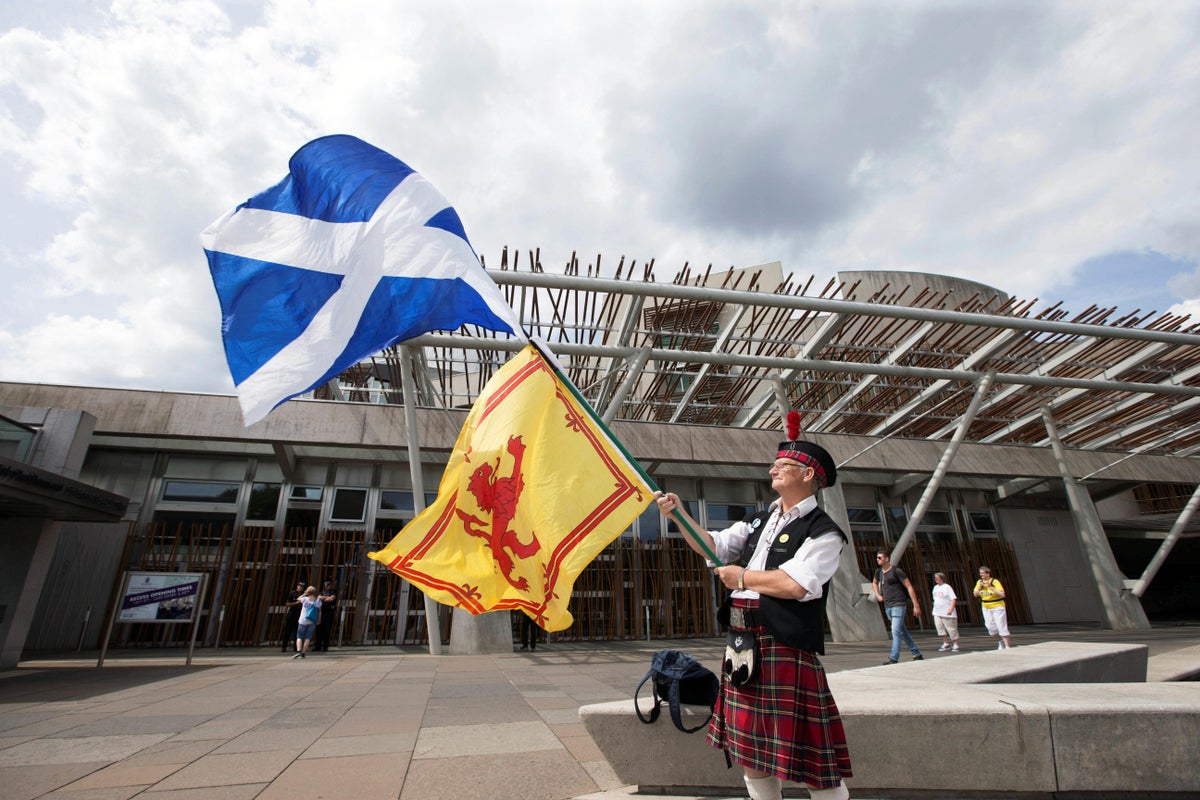
The Scottish Government’s proposed Bill on an independence referendum “squarely and directly” relates to a matter reserved to Westminster, the Supreme Court has been told.
The UK Government’s legal representative said it is “obvious” that the Scottish Parliament does not have competence to legislate for a second referendum.
Sir James Eadie KC also said the question of the Scottish Independence Referendum Bill’s competence should not be “farmed out” to the Supreme Court.
However the Lord Advocate, the Scottish Government’s most senior law officer, said his characterisation of the case is “so unfair” and the matter was only referred to the court after “detailed consideration”.
On Wednesday, the two sides made their final legal arguments in a two-day hearing before five Supreme Court justices in London.
As proceedings concluded, the court’s president Lord Reed said they would deliver their judgment “as soon as we can”.
He has previously said it would be “some months” before the court could come to a decision.
Lord Advocate Dorothy Bain KC has asked judges to resolve the issue of whether Holyrood has the legal power to bring forward the Bill.
On Wednesday morning, Sir James continued arguments on behalf of the Advocate General for Scotland, saying the Lord Advocate’s request risked “dragging the court into the political process”.
He argued the Bill was at too early a stage for the court to issue a ruling on.
He told the court a person in charge of a Bill at Holyrood must make a “positive” statement that it is within the competence of the Scottish Parliament.
“It is for the person in charge of the Bill to form that view,” he said, adding it is not “simply to be farmed out to the Supreme Court”.
The Scottish Government do not like the answer that she has given on competence— Sir James Eadie
Discussing the competence of the proposed Bill, he said: “It isn’t as though the Lord Advocate, in this case, cannot answer the question in 31.1 (of the Scotland Act).
“The difficulty is that she can answer it and has done so.
“The problem for her is that the Scottish Government do not like the answer that she has given on competence.”
He later told the court the proposed Bill is “self-evidently, directly and squarely” about a matter reserved to Westminster – the union between Scotland and England.
He said: “The impacts and effects of Scottish independence would be felt throughout the United Kingdom.
“All parts of the United Kingdom have an interest in that issue, not just Scotland.
“It’s obvious why it’s reserved to the United Kingdom Parliament. It’s of critical importance to the United Kingdom as a whole.
“It’s equally obvious why the union could not be a matter over which the Scottish Parliament has competence.
“It would be fundamentally at odds with the purpose of devolution to grant powers to the Scottish Parliament within the union.”
He said the Lord Advocate’s argument that the Bill does not relate to the union is “untenable”.
Sir James said the Lord Advocate had brought a “strange” case to the Supreme Court, with arguments that go against “common sense”.
The fact the proposed referendum was not self-executing does not mean it does not relate to a reserved matter, he argued.
In her final submissions before the hearing adjourned, Ms Bain sought to rebut Sir James’s earlier points around the jurisdiction of the court.
She said: “The reference has been brought not because the issue is trivial or one that has been raised on a whim or willy-nilly.
“It is a matter of the utmost constitutional importance.”
Describing Sir James’s depiction of her case as “so unfair”, she told the court the matter has been “a real issue, a festering issue, since the early days of devolution”.
Ms Bain said Sir James’s “characterisation of what is involved here is unfair. It’s just not right”.
She said it was Scotland’s First Minister Nicola Sturgeon who had asked her to make a reference to the court.
“So it was on request of the minister that the reference was considered by me independently of government,” Ms Bain said. “After having given the matter detailed consideration… I decided to make this reference.”
Before the court adjourned, Lord Reed made a short statement to those present.
He reiterated the panel of five justices “will require time to consider what we’ve heard”, adding they “appreciate the importance of this and we will let you have our judgment as soon as we can”.
Following the hearing’s conclusion, Scottish Tory leader Douglas Ross said it was “irresponsible” for Ms Sturgeon to focus on independence.
He added: “The hearing before Scotland’s and the UK’s highest court may be over but we know Nicola Sturgeon will continue to be distracted by this issue as she prepared to launch her latest dubious paper advocating independence.
“Meanwhile, Scotland will be in limbo for months as the Supreme Court ploughs through mountains of paperwork before issuing its judgement.”







